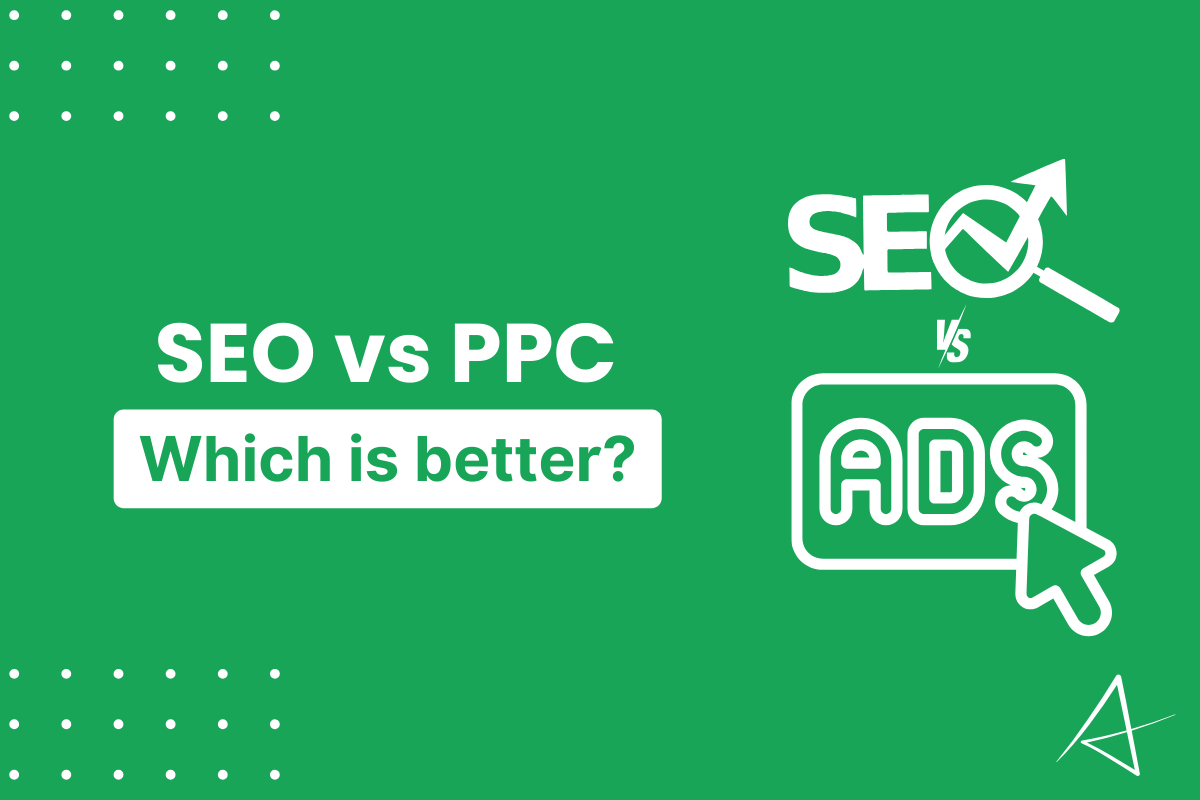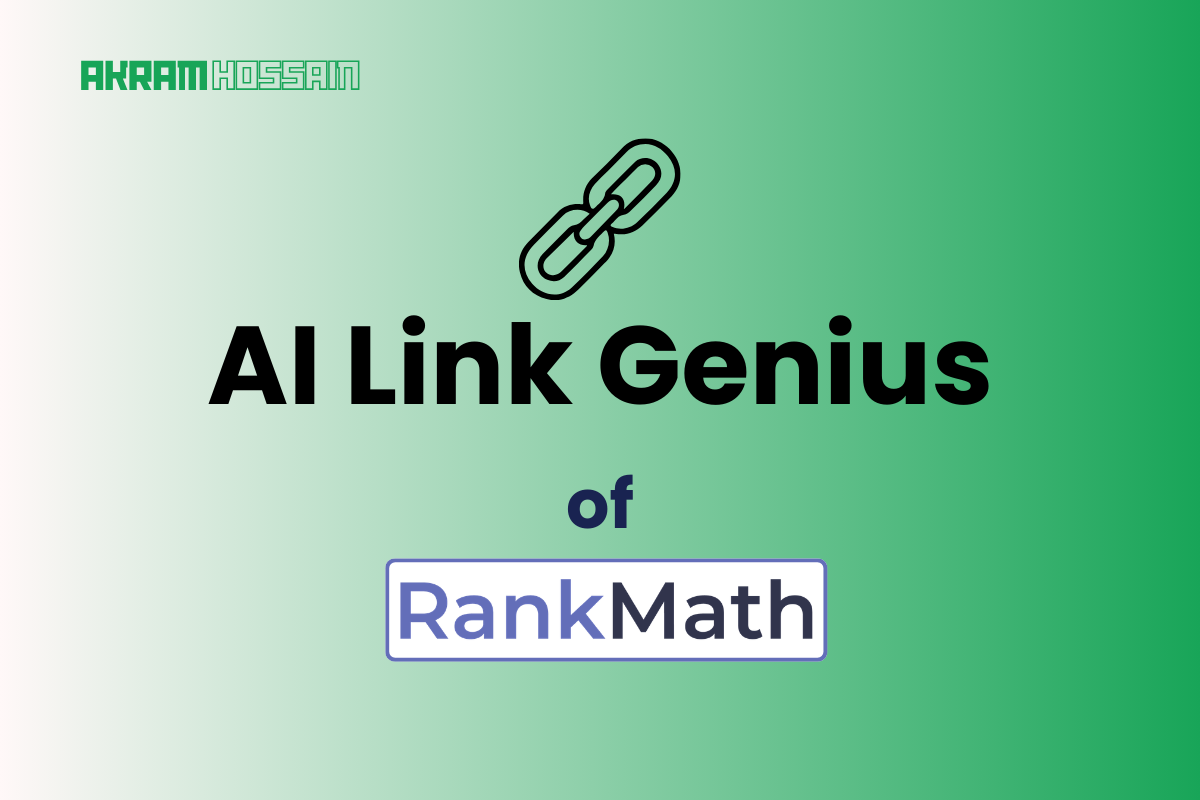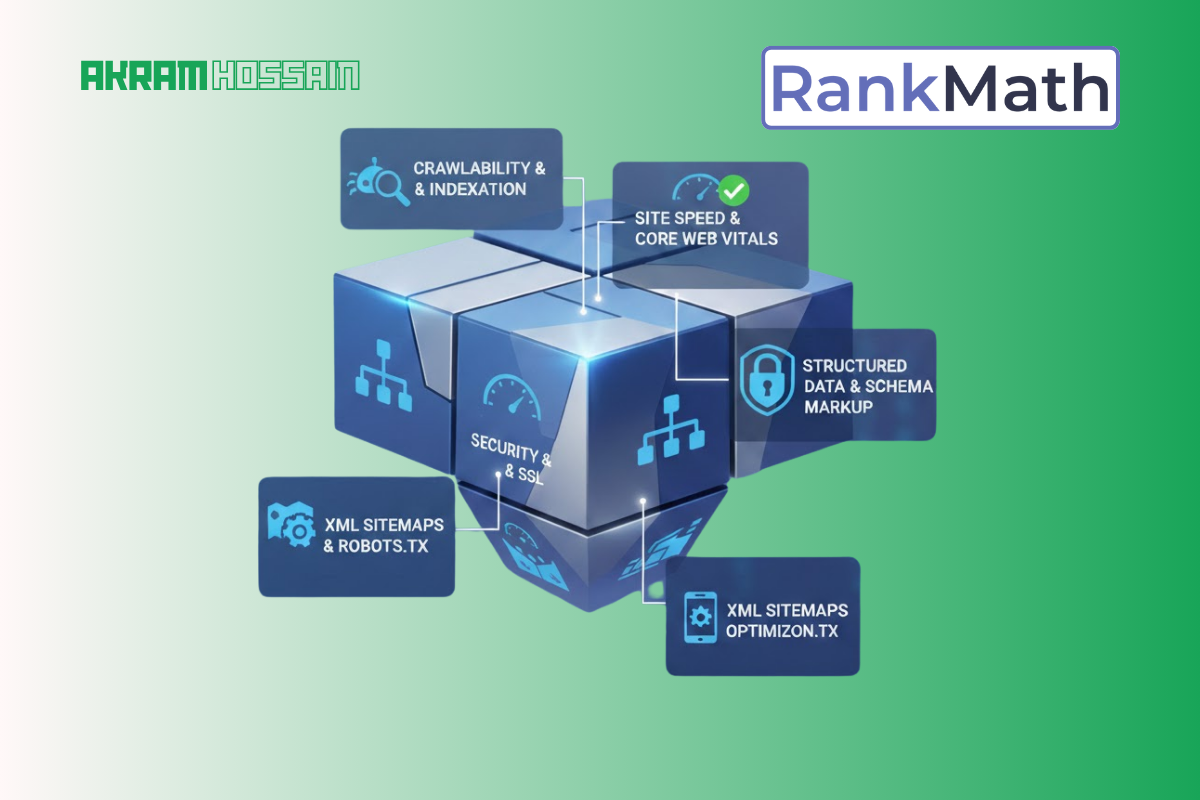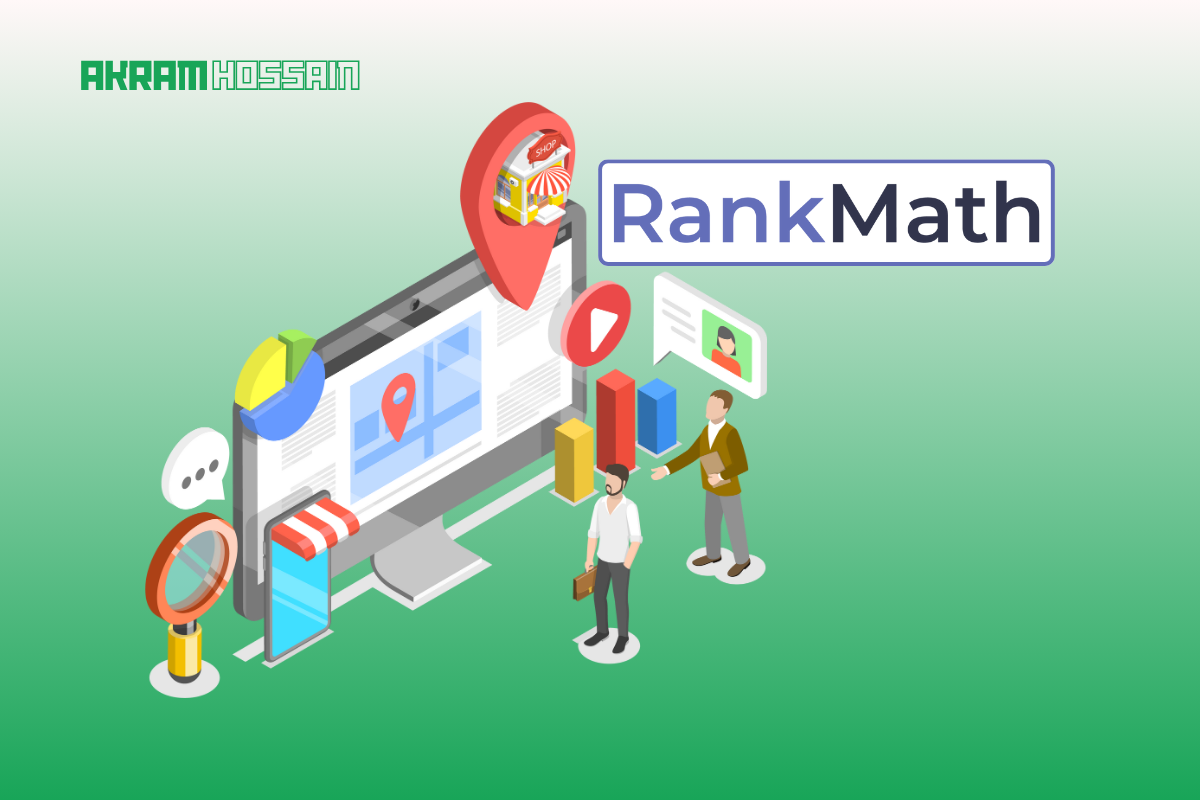SEO boosts your site organically and provides long-term results after a certain period of time. But the opposite is seen in PPC.
Hey, wait! I’m telling you this because I hope you already know the title of this blog post.
SEO and PCC aren’t competitors for each other, but they have some extra specialties and features that work for different angles of your business online.
If you are in the same situation as others, which should we do first of our business, then let’s start the discussion, and hopefully, you will get the the answer.
First, let’s briefly discuss SEO followed by PPC, and clarify the idea with examples and context.
What does SEO do?
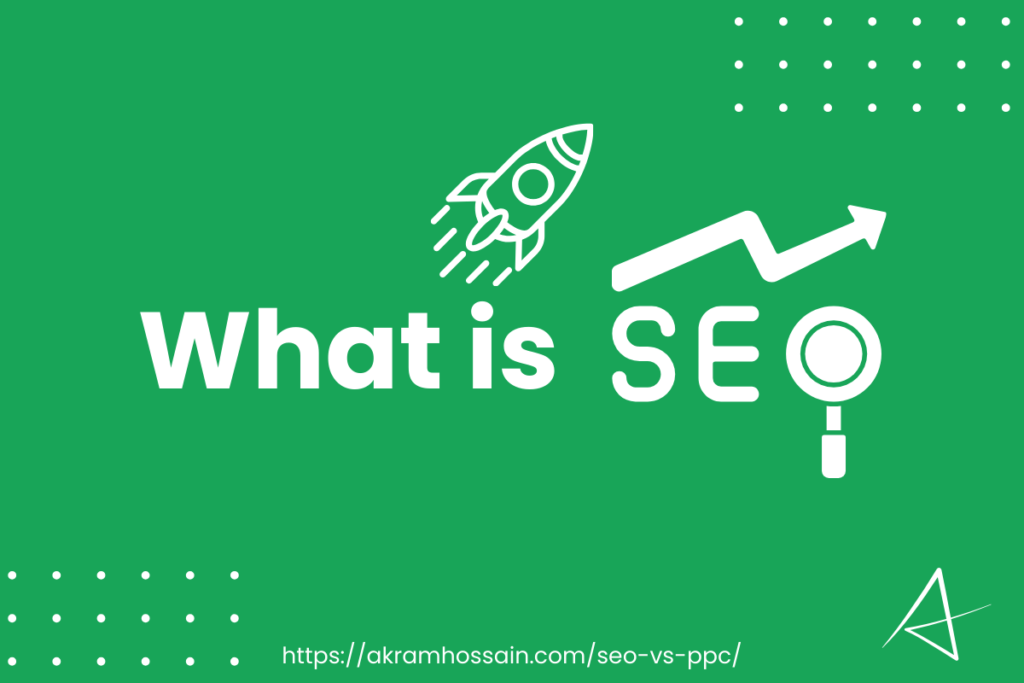
Search Engine Optimization (SEO) is a process for a website that fulfills all of the requirements to get ranked on Search Engines like Google, Bing, and others.
SEO improves a website’s visibility through essentials like content, keywords, tags, and the rules of Google Search Essentials (formerly Webmaster Guidelines).
Paying zero to any search engine like Google will ensure that your site appears on the Search Engine Result Page (SERP). That’s the main theme of SEO.
How SEO Works?
SEO works with many factors that are defined by Google and other search engines, but here are some major factors that you should know about;
Search Engine Optimization: I said to use proper keywords, meta titles, and descriptions and optimize headings and H tags, which are crucial for a blog.
After completing all of your on-page SEO checklist, you are ready to publish your content.
Now, Google will crawl, index, and rank your content based on your content information. Remember, Indexed content doesn’t mean that your content is ranked.
Ranks depend on 200+ factors you should know about and work on. Let me explore the content optimization and SEO working process;
- Keyword Research: Keyword research is the key to your SEO journey. It makes your content writing easier and flawless compared to your competitors. To learn more about keyword research, read my complete keyword research guide.
- Content Creation: After keyword research, it’s time to write content with the information needed for your audience. Content should be helpful, unique, and contain facts related to the topic.
- On-Page Optimizing: Optimize your content from the on-page, such as proper headings, meta titles, and descriptions that are unique and related to your whole content.
Internal link your content with your own relevant content that is useful for readers. - Of-Page Optimizing: Create outside linking for your content with relevant topics and natural backlinks for your content from higher domain authority (DA) sites.
Now, let’s move on to the PPC topic, where you should know the basics of pay-per-click (PPC).
What is Pay Per Click (PPC)?
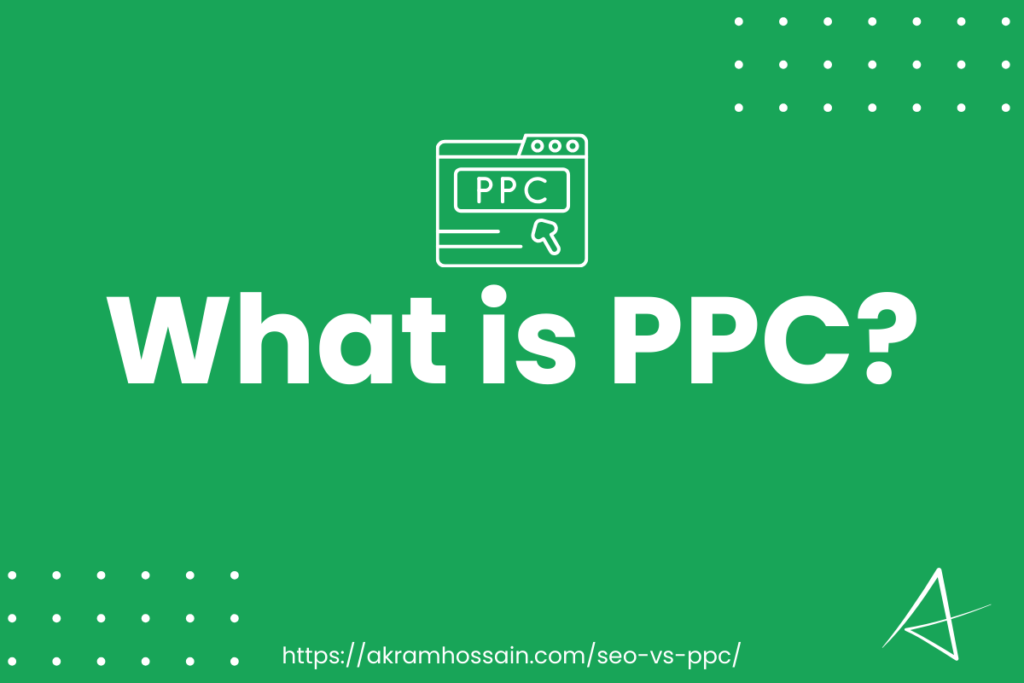
Pay-Per-Click (PPC) advertising is an online marketing process where advertisers pay a fee each time someone clicks on one of their ads. Based on some specific keywords, advertising platforms show “ads”/”sponsored” results to search engine result pages, videos, banners, apps, and many other places.
It’s essentially a way to buy targeted visits to your website, landing page, or app using different platforms like; Google, Meta (Facebook, Instagram, Messenger), Bing, and others.
How does PPC work?
Inside the PPC management dashboard, we set the amount against some specific keywords for our landing page, URL, or app.
Example: Google Ads is the platform for Google Pay Per Click marketing, here marketers set their budget based on location, keywords, brands, audience, and other data.
Marketers pay Google to show their web page URLs with customized Titles, URLs, meta descriptions, Sitelinks, and other necessary information in the SERPs.
PPC Working Process
- Creating ads: Just create ads with proper headings, landing pages, site links, CTA, and other information that you need to add. It depends based on your goal.
- Bidding on Keywords: Set the bidding amount for your targeted keywords so that, Google or another platform won’t deduct an uncertain amount for a click. You have full rights to set the exact amount for the bid.
- Ads Live: After submission for live, it will pass the verification, and if passed, your ads will be live, and you can see them in search results as “ads/sponsored.” When someone clicks on your ads, Google will deduct the bid amount from your Google Ads balance. That’s the main mechanism of PPC work.
Remember, most PPC platforms work with the same theory but dashboard appearance can differ.
SEO vs. PPC | Head-to-Head Comparison
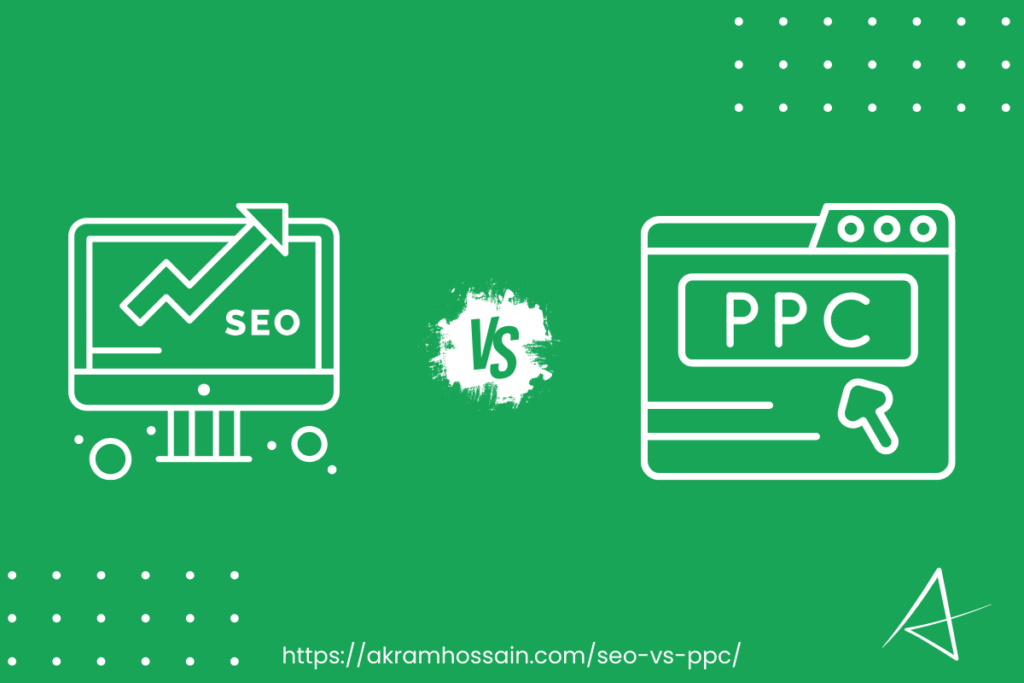
| Factor | SEO | PPC |
| Cost | Generally free (ongoing effort required) | Pay per click (costs can add up quickly or advanced) |
| Time to See Results | Long-term (weeks to months to see significant impact) | Fast (ads can appear within minutes of set-up) |
| Traffic Control | Limited control over who sees your website | Highly targeted traffic based on demographics, keywords, and interests |
| Sustainability | Long-lasting results with ongoing maintenance | Results stop immediately once ads are paused or the budget runs out |
| User Perception | Organic results are seen as more trustworthy and credible | Ads are clearly labeled and perceived as promotional content |
Let me explain this table for your convenience;
- Cost: SEO does not need to pay extra to appear in search results, but SEO requires some extra effort fees to hire an SEO to optimize a website.
Conversely, PPC is always paid to pay.
SEO wins this point. - Time for Results: SEO needs a few times, such as a week to a month, to get impactful results from SERPs. On the other hand, PPC needs no time to get results. You just need to get your ads “Live,” and boom—you are cooking now.
SEO wins this point. - Traffic Control: Based on limited keywords, you can limit traffic control for SEO, it’s highly impossible to target 10 keywords for a single blog or article. However, PPC has the broad option to target a bunch of keywords for a single landing page.
PPC wins this point. - Sustainability: As I said above, SEO has long-term organic results, and it requires less effort to get long-term results from SERPs. Without paying Google or other PPC platforms, your ads will stop immediately.
SEO wins this point. - User Authority: When someone searches and finds you organically on SERPs, if they think you are valuable to them, you will get a potential one. But PPC has forceful or promotional content that might be unintentional traffic. Or, they are actually not aware of you in their search results.
SEO wins this point.
SEO wins the majority of points, but it depends on the factor and the market demand for a business.
Now, let’s see when to use SEO and PPC for itself.
When to Use SEO for Your Business?
Well, it depends on your business strategy and the current and upcoming situation there. If you have enough time to start your SEO campaign and see the impactful results, SEO is for you, and you are ready to expand your business with an SEO strategy.
You should follow the following aspects for SEO in your business;
- Organic Traffic and Long-Term Result: I said before that SEO is not an overnight success; it’s the result of the full effort that you will have to give to your website from every end.
Focusing on sustainable results that may give you long-term profit for your business. SEO is good to go for you. - Targeting Based on Search Intent: “Search Intent” isn’t controlled by anyone on the internet. (Maybe Google has) It completely depends on searchers who search for his solution. Providing helpful and informative content, you can target existing search intent by using proper keywords that actually address those queries.
Rank isn’t guaranteed, but targeting the right keywords may match search intent and generate potential traffic. - Building Brand Authority and Trust: Providing quality, useful, authentic, and E-E-A-T-qualified content for your audience, will automatically create a fanbase for your business online. By regularly uploading content with a specific niche or topic, users will get pre-trigger to read your content with trust and they will automatically read your content for their knowledge.
These are the fundamental aspects to go for an SEO campaign that improves brand value, trust, and potential customers day by day organically.
Long story short;
- SEO is right if you have a new blog focused on a particular niche and want to attract a loyal readership.
- Your e-commerce website sells handmade crafts, and you want to target users searching for those items.
- You’re a local business (e.g., plumber, dentist) and want to improve your visibility in local search results.
- Choose SEO for those businesses or websites that don’t need quick results, you have enough time to cook your site.
When to Use PPC?
Expecting immediate results and faster growth with your business? There are no options except PPC for you.
SEO and PPC aren’t competitors of each other, but I said that for faster growth, PPC is everyone’s first choice, and sometimes it’s essential to boost your business.
- Immediate Results: PPC is ideal for businesses that need a quick influx of traffic, such as launching a new product, promoting a limited-time offer, or running a flash sale.
On special occasions, PPC is necessary for quick results depending on your geolocation, festivals, and culture. - Highly Targeted Campaigns: PPC offers granular targeting options. You can target your ads to specific demographics, interests, locations, and even user behavior. It’s a customized targeting platform that gives you several options to reach your goal with ease. (Bucks is required to do).
- Promoting Special Offers and Events: PPC ads highlight special promotions, discounts, or upcoming events. You can run campaigns using PPC for religious festival sales, cultural events, brand promotion, special product launch promotion, and many more. SEO can’t do this for as long as you expected.
- Launching a New Product or Service: As I said above, PPC can help generate initial awareness and excitement. Targeted ads can reach potential customers who haven’t discovered your brand yet but might be interested in what you offer or your new product.
PPC is a strategic tool for businesses that need a fast, targeted way to reach a specific audience and drive immediate action on their website.
Are SEO and PPC Competitors for Each Other?
No, SEO and PPC are different platforms for different purposes. They are the complement for each other.
They generate traffic in different ways, but the ultimate goal and the way they are the same.
SEO generates traffic organically that provides long-term sustainable results; conversely, PPC generates paid traffic as long as you are paying for PPC platforms.
PPC can be a great way to supplement your SEO strategy. While you work on building long-term organic traffic, PPC ads can help fill the gap and drive qualified leads.
You can even use PPC data to inform your SEO keyword strategy by identifying high-performing keywords that deserve organic ranking focus.
Can I Run the PPC and SEO Campaign Together?
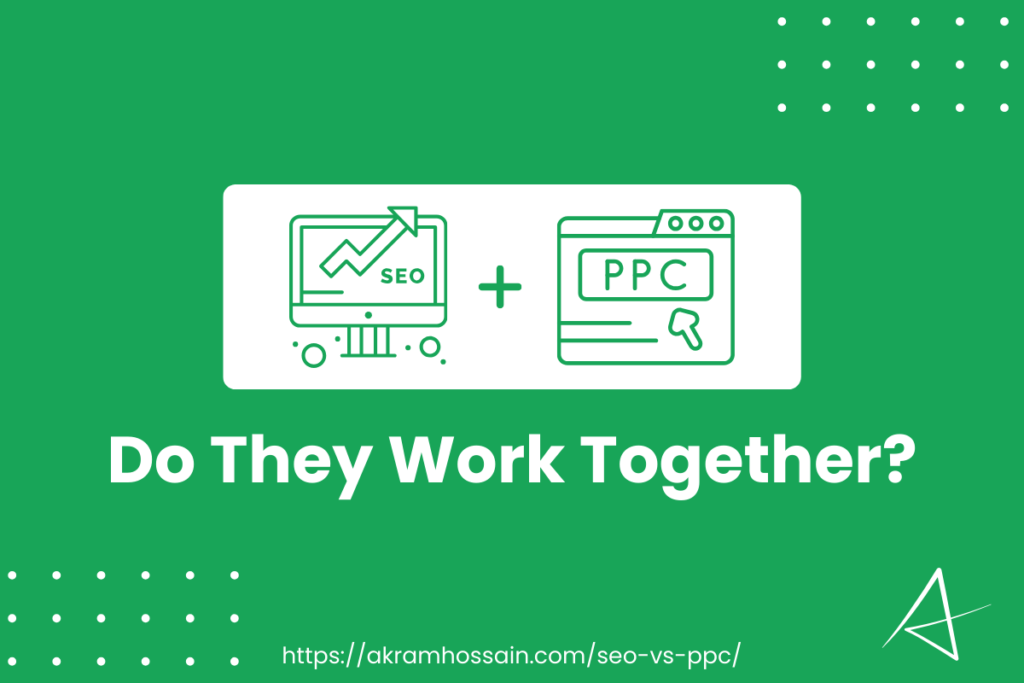
Yes, it is absolutely fine to use SEO and PPC campaigns to run together to get quick results or brand promotion, as well as get organic traffic for your business.
Even though, you can’t complete your PPC campaign without the SEO part, look weird? No way, let me clear.
When you start to run your PPC campaign, you must optimize your landing page for users.
Optimizing on-page SEO of your landing page for PPC is the part of SEO that you have completed with the help of SEO fundamentals.
SEO is required for PPC, but PPC isn’t required to run an SEO campaign for your business. Although PPC is paid, that doesn’t mean you will get a higher rank with the help of your bucks.
You need an optimized and Google policy-approved landing page/Website URL or app that is appropriate to run a Pay Per Click campaign.
Thousand of businesses are using SEO and PPC together for better results, and I think it’s the best way to explore your business online and run both campaigns together.
Google and other search engines don’t harm your business by running SEO and PPC together; on the other hand, PPC with SEO makes for better ROAS (Return On Ad Spend).
An SEO knows where to use a button or an element for a better user experience and to get user satisfaction as well as user conversation. PPC brings traffic to your landing page or app and SEO polishes it to convert.
The final thought about using consolidate is that it is useful and the best way to create a strong digital marketing strategy for any business.
Conclusion
In the world of digital marketing, both SEO and PPC play crucial roles in driving website traffic and achieving your business goals. While they differ in approach and timeframe, they aren’t necessarily mutually exclusive.
Recap:
SEO is ideal for long-term organic traffic growth, targeting existing search intent, and building brand authority and trust. You need to make an effort to explore your strategy organically.
PPC generates immediate results, highly targeted campaigns, promotes special offers and events, launches new products or services, and complements SEO efforts.
I’m saying again that SEO and PPC work together, and it’s the best way to grow your business faster with SEO.
If you don’t have budget concerns, PPC is the key to unlocking the success of your business overnight with proper strategy.
So, What is your first choice?
